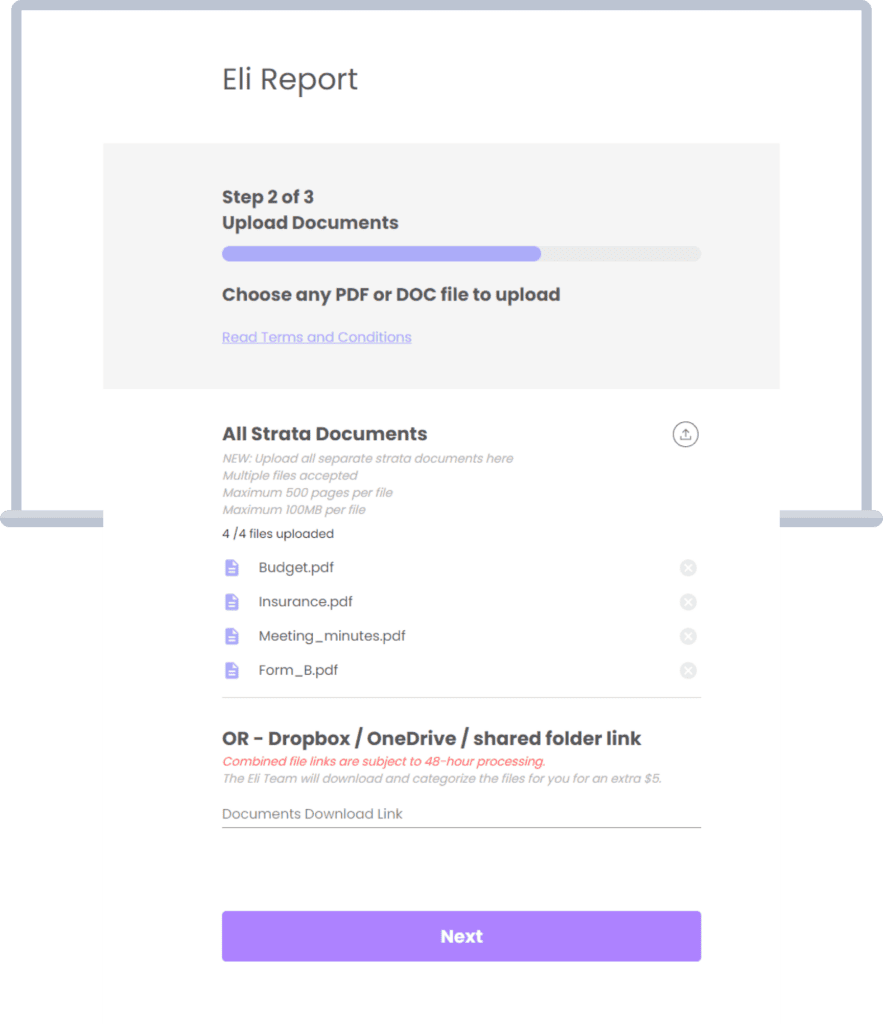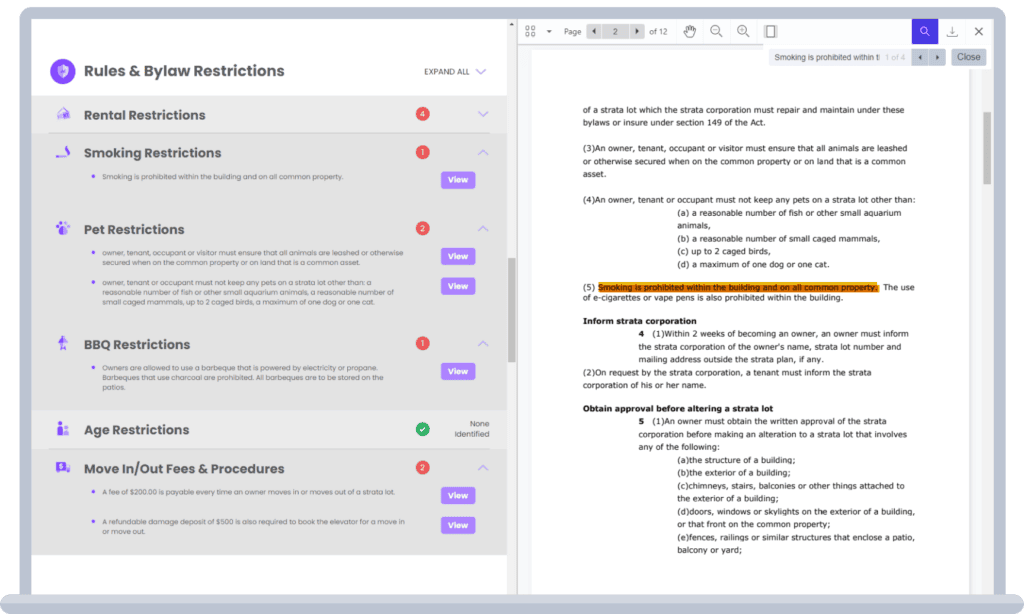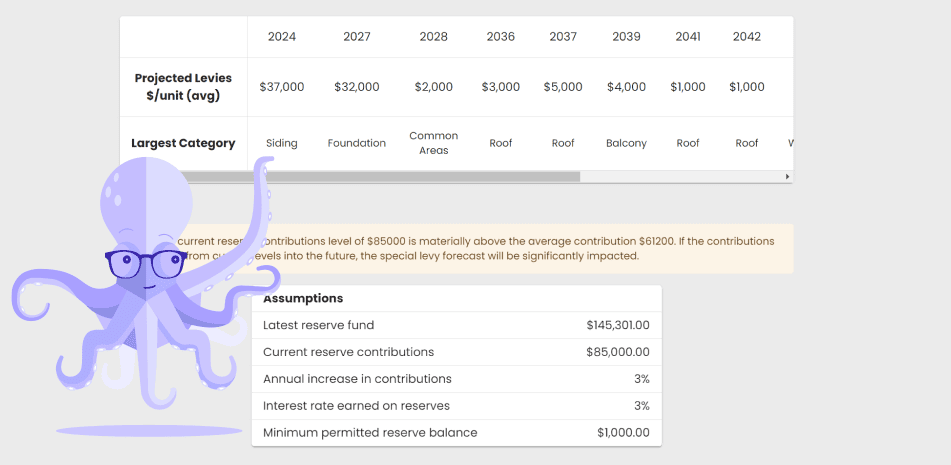When buying a condo, thoroughly reviewing condo documents is essential to avoid unexpected financial burdens or restrictions.
We will cover the primary red flags to watch for in condo documents, including financial, legal, and operational issues that could impact your home purchase.
We’ll also dive into an easy way to automate condo document review.
Top Major Red Flags in Condo Documents
These are some critical issues to keep an eye on when reviewing condo or strata documents, as they can indicate potential problems or costly responsibilities.
High or Rising Condo Fees
Condo fees, also called “maintenance fees,” are monthly payments each condo owner makes to cover shared expenses, like building repairs, landscaping, security, and amenities.
Why It’s Important
When fees are high or keep increasing, it might mean the condo has costly upkeep or unexpected expenses. Sometimes, fees go up because the condo board didn’t plan well for repairs and now needs extra money to catch up.
If you don’t notice these rising fees before buying, you might end up paying more than you expected every month. For example, some buyers found their fees went up hundreds of dollars shortly after they moved in. In Vancouver, for example, condo owners saw fees rise significantly due to expensive repairs on older buildings.
Special Assessments of Levies (past or upcoming)
Special assessments are extra charges condo owners pay when the regular condo fees don’t cover a big expense, like a roof repair or plumbing fix. They’re like surprise bills and can cost thousands of dollars.
Why It’s Important
If a condo often has special assessments, it might mean the building isn’t being maintained well, or the condo board isn’t saving enough for repairs.
Ignoring past or upcoming assessments can leave you with a big bill after you buy the condo. For example, a couple purchased a condo in August 2022, relying only on the Form B information certificate and depreciation report provided by their realtor. They later faced a significant special levy for balcony replacements throughout the complex, which was not clearly indicated in the documents they reviewed.
Pro Tip
Simplify the upcoming special levy info with Eli Report’s Special Levy Forecast tool. We project the timing, amount and primary expenditure for special levies, shown on a dollar per unit basis (average).

Legal Issues or Litigations
Legal issues in condos can involve lawsuits between the condo board and contractors, owners, or even the city. These disputes can be about unpaid fees, construction issues, or resident conflicts.
Why It’s Important
Ongoing legal problems are a big red flag. They can mean the building isn’t well-managed or that there’s a serious problem needing resolution. Legal battles can cost a lot and may lead to higher fees or special assessments.
Ignoring legal issues can bring you unexpected costs or problems. A cautionary tale comes from Las Vegas, where a massive HOA fraud scheme was uncovered. The mastermind behind the scheme was sentenced for defrauding HOAs of millions of dollars.
Checking for these problems early on can save you from joining a building with costly disputes.
Inadequate Insurance Coverage
Insurance coverage for an HOA or condo building should protect against things like fire, floods, and other accidents in shared spaces. It’s important that the condo has enough insurance for the whole building.
Why It’s Important
Without good insurance, condo owners could face huge costs if something major happens, as the building won’t be fully covered. This can leave owners with big repair bills. Or, poor coverage can leave owners on the hook for securing additional insurance, which can increase your monthly costs. On average, 10-25% of your strata / condo fees go towards your building’s insurance policy premium.
Underfunded Reserve Funds
A reserve fund is a pool of money saved for major repairs or replacements, like fixing the roof or updating the heating system. A healthy reserve fund means the building is ready for big repairs.
Why It’s Important
If the reserve fund is too low, the condo board might not have enough money to cover important repairs, leading to extra charges for owners through increased fees or special assessments.
Not checking the reserve fund can mean facing high costs later.
In South Florida, condo owners are facing a stark example of underfunded reserve funds, as many are being hit with six-figure special assessments to cover long-overdue repairs and maintenance. This financial shock has led some owners to sell their properties at a loss, highlighting the severe consequences of inadequate reserve planning in condo associations.
Pro Tip
Use Eli Report’s Condo Financial Health Assessment tool to easily understand the reserve fund and related budgets.
Inconsistent or Messy Meeting Minutes
Meeting minutes are notes taken during condo board meetings that record what was discussed and any decisions made. They should show what’s happening with the condo’s management and finances.
Why It’s Important
Messy or incomplete minutes might mean the board isn’t organized or transparent, which could lead to poor management. If issues keep coming up in these notes without being solved, it can point to deeper problems in the building.
If you skip reviewing these minutes, you might miss signs of ongoing disputes, like frequent complaints from residents. In Calgary, a condo owner faced a $25,000 special assessment shortly after selling his unit due to the board’s lack of transparency and inconsistent record-keeping. The property manager failed to provide crucial building reports and meeting minutes when requested, despite having access to engineering assessments that indicated significant upcoming repairs, highlighting the importance of thorough and transparent condo documentation.
Other Minor Reg Flags to Watch For
These red flags may not be as serious as the ones above, but they still provide valuable insights into the condo’s management and community.
Deferred Maintenance
Deferred maintenance refers to repairs or upkeep that have been delayed. For example, common areas like hallways, lobbies, or elevators might look worn out or broken, with repairs constantly postponed.
Why It’s Important
If maintenance is often delayed, it could mean the condo board is struggling with budgeting or doesn’t prioritize keeping the building in good condition. Deferred maintenance can lead to bigger, more expensive problems down the road.
The case of Three Horizons South, a 50-year-old highrise in North Miami, illustrates the dangers of deferred maintenance. Residents reported issues including rusting pipes, a giant hole near the top of the building, missing balconies, and others needing repair. One resident, Melina Moren, stated, “The condition of the building has deteriorated within the last couple of years,” noting problems like a leaky roof that could cause water damage and mold issues.
Lots of Changes to Board Members or Property Managers
Frequent changes in board members or property managers can indicate instability. If people keep leaving these positions, it could be a sign of poor management or conflicts within the condo board.
Why It’s Important
A stable board and property manager usually mean better management of finances and maintenance. Frequent turnover can make it hard to keep consistent policies, and you might face issues with rule enforcement or delayed decisions on repairs and budgeting.
Ignoring this red flag might mean you end up in a building with unstable management, leading to poor decision-making or neglect of necessary repairs.
Overly Restrictive Bylaws
Bylaws are the rules that condo owners must follow. Some condos have very strict bylaws that could limit things like having pets, making renovations, or even what you can hang on your balcony.
Why It’s Important
Overly strict rules can make living in the condo less enjoyable, especially if they restrict things important to your lifestyle. For instance, if you have a pet, and the condo has a strict no-pet rule, this can be a big problem. Or if they overly enforce certain rules, like this one owner’s tenant experienced:
A British Columbia tribunal ruled that a $200 fine imposed on condo owners for a tenant dropping a single French fry in the elevator lobby must be reversed, as the evidence was obtained through CCTV footage, violating provincial privacy laws. The tribunal found the fines significantly unfair since there was no other supporting evidence to identify the tenants responsible for the alleged conduct.
Recommended Resource: The 6 Most Important Bylaws to Look Out for When Buying into a Strata
Consistent Complaints for a Neighboring Unit
If meeting minutes show repeated complaints about a particular unit or resident, it could indicate a problem. These complaints might be about noise, disturbances, or conflicts with other residents.
Why It’s Important
Frequent complaints could mean that living near this unit might be uncomfortable. Noise complaints or other issues could affect your quality of life, especially if the condo board hasn’t resolved them.
Overlooking these complaints might mean you end up living next to a difficult neighbor, which can lead to stress and frustration.
Bought a condo, only to discover that your neighbors are loud?
byu/Fartel inAskNYC
How to Find Red Flags in Condo Documents in Minutes
Reviewing lengthy condo documents can be challenging, especially for first-time buyers. Eli Report simplifies this process through AI-powered analysis, helping you spot potential red flags in just a few steps.
Step 1: Choose the Condo Files to Upload
Upload the essential condo documents like CC&Rs, bylaws, meeting minutes, and financial statements to Eli Report.

Step 2: Let Eli Run
Eli Report scans each document to identify relevant information, highlighting critical data points such as rising fees, special assessments, or underfunded reserves.
Step 3: Review Your Report and Summarizations of Important Info
Eli Report provides a summary of each document, making it easy to see any red flags that require attention. This helps buyers make informed decisions faster, potentially avoiding costly or problematic properties.

Final Thoughts
Spotting red flags in condo documents is essential to protect your investment and avoid future financial surprises.
Eli Report can simplify this process, ensuring that you are fully informed before closing. For an efficient and accurate review, consider running a report on Eli Report today.

